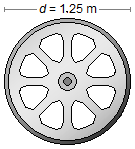Solved Problem on Circular Motion
advertisement
A locomotive departs from station A and arrives at station B, 240 km away from station A, after 4 hours. The diameter of the wheels is 1.25 m. Determine:
a) The average number of rotations per minute of each wheel;
b) The angular speed of a point situated on the wheel.
Problem data:
- Distance between stations: Δ S = 240 km = 240,000 m;
- Time of travel: Δ t = 4 h;
- Diameter of a wheel: d = 1.25 m;
We chose a reference frame with an origin in station A and pointing to the right towards station B.

Solution
First, we convert the time units, given in hours (h), to minutes (min) used in the problem
First, we convert the time units, given in hours (h), to minutes (min) used in the problem
\[
\begin{gather}
\Delta t=4\;{\mathrm{\cancel h}}\times\frac{60\;\mathrm{{min}}}{1\;\mathrm{{\cancel h}}}=240\;\mathrm{min}
\end{gather}
\]

a) The number of rotations, n, that the wheel will give throughout the trip will be
\[
\begin{gather}
n=\frac{\text{total displacement}}{\text{length of one lap}}=\frac{\Delta S}{C} \tag{I}
\end{gather}
\]
The length of the circle (one lap) is given by
\[
\begin{gather}
\bbox[#99CCFF,10px]
{C=2\pi r}
\end{gather}
\]
as d = 2 r is equal to the diameter of the wheel given in the problem and letting
π = 3.14
\[
\begin{gather}
C=\pi d\\[5pt]
C=3.14\times(1.25\;\mathrm m)\\[5pt]
C\approx 3.93\;\mathrm m
\end{gather}
\]
Substituting this value and the distance traveled given in equation (I)
\[
\begin{gather}
n=\frac{240000\;\mathrm m}{3.93\;\mathrm m}\\[5pt]
n\approx 61068\;\text{rotations} \tag{II}
\end{gather}
\]
that is the number of rotations that the wheel makes throughout the trip. Dividing this value by the
time of the trip in minutes, found above
\[
\begin{gather}
N=\frac{n}{\Delta t}\\[5pt]
N=\frac{61068\;\text{rotations}}{240\;\mathrm{min}}
\end{gather}
\]
\[
\begin{gather}
\bbox[#FFCCCC,10px]
{N\approx 254.5\;\mathrm{rpm}}
\end{gather}
\]
b) The angular velocity is given by
\[
\begin{gather}
\bbox[#99CCFF,10px]
{\omega=2\pi f} \tag{III}
\end{gather}
\]
to find the frequency, f, we convert the number of rotations per minute found in the previous item in hertz (Hz)
\[
\begin{gather}
f=254.5\;\frac{\text{rotations}}{\cancel{\mathrm{min}}}\times\frac{1\;\mathrm{\cancel{min}}}{60\;\mathrm s}=4.2\;\mathrm{Hz}
\end{gather}
\]
substituting this value into equation (III)
\[
\begin{gather}
\omega=2\times 3.14\times\left(4.2\;\mathrm{\frac{1}{s}}\right)
\end{gather}
\]
\[
\begin{gather}
\bbox[#FFCCCC,10px]
{\omega=26.4\;\mathrm{rad/s}}
\end{gather}
\]
advertisement

Fisicaexe - Physics Solved Problems by Elcio Brandani Mondadori is licensed under a Creative Commons Attribution-NonCommercial-ShareAlike 4.0 International License .